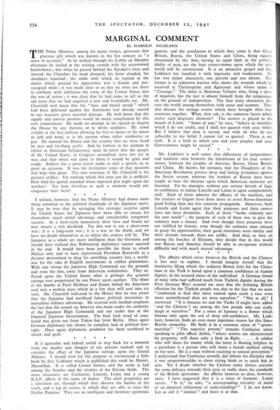The affinity which exists between the British and the Chinese
is less easy to explain. I should imagine myself that the instinctive liking which the ordinary Briton feels for the China- man or the Turk is based upon a common confidence in human dignity, in the assured status of the individual. A German friend of mine (who had suffered much from Turkish dignity during the First German War) assured me once that the irritating British affection for the Turkish people was due to the fact that we were " comforted to find that there existed upon earth a race even more unintellectual than we were ourselves." "Not at all," I answered. " It is because we and the Turks (I might have added ' and the Chinese ') are among the few people who can really laugh at ourselves." For a sense of humour is a flower which blooms only upon the soil of deep self-confidence. Mr. Link- later, however, finds an even more ingenious reason for this Sino- British sympathy. He finds it in a common sense of " sports- manship." " The superior person," remarks Confucius when speaking to pilot officer Arden, " whose actions are characterised by propriety, will shoot only a bird in flight. . . . A soldier who will shoat his enemy while the latter is floating helpless in a parachute is a person who will shoot a female mallard sitting on her nest. He is a man without teaching or natural perception." I understand that Confucius actually did inform his disciples that it was unsportsmanlike to shoot sitting birds or to catch fish in nets. Yet I doubt whether the Chinese today always exercise the same delicacy towards their prey or really share the standards of the British sportsman. An affinity between us does, however, exist. I have suggested that it is a sense of humour. Lenin sneers. " Is it," he asks, " a corresponding triviality of mind or an identical refinement of understanding? " I do not know. Let us call it " instinct " and leave it at that.


























 Previous page
Previous page